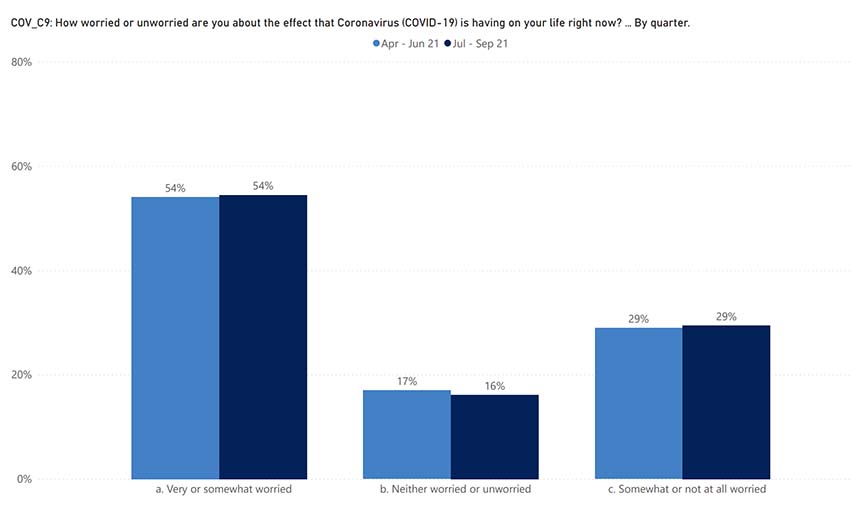The Northern Ireland Statistical Research Agency (NISRA) Coronavirus (COVID-19) Opinion Survey
The latest set of results from the NISRA Coronavirus (COVID-19) Opinion survey were published today by the Northern Ireland Statistics & Research Agency.
Coronavirus (COVID-19) Vaccinations
- One in nine (11%) of those interviewed in the period July – September 2021 had not received a Coronavirus (COVID-19) vaccine at the time of interview.
- While just over half of the people concerned (55%) indicated that they were likely to take the vaccine, the remainder (45%) said that they were unlikely to do so.
- The most common reason given by those who said they were unlikely to have the vaccine was that they were worried about the side effects (52%). Some 45% said that they had worries about the long-term effects on their health and approximately one in three said that they did not think the vaccine was safe (34%), or they preferred to wait to see how well the vaccine works (31%).
Personal Risk from Catching Coronavirus (COVID-19)
- During the period July – September 2021, people were asked a question about their perception of the personal risk to them from catching Coronavirus (COVID-19).
- Approximately, three out of ten people (28%) felt that there was a very high or high risk to them from catching Coronavirus (COVID-19). In contrast, 41% of people considered the risk to be low or very low. The remaining 31% thought that the risk was neither high nor low.

Diagnosis of Coronavirus (COVID-19)
- Approximately, one in eleven people (9%) interviewed in the period July – September 2021 reported that they had tested positive for Coronavirus (COVID-19).
- Those who had not tested positive were asked a further question about whether or not they thought they might have had Coronavirus (COVID-19), 15% of whom thought that they might.
Long Term Effects of Coronavirus (COVID-19) (Long COVID)
- People interviewed in July – September 2021 who had either tested positive for Coronavirus (COVID-19) or who thought that they might have had Coronavirus (COVID-19) were asked a further question about whether or not they had experienced Long COVID.
- Approximately, one in five of the people concerned (22%) said that they had experienced Long COVID with the vast majority (83%) indicating that it had negatively affected their general wellbeing. Some 62% said it had negatively affected their ability to exercise and 39% reported that Long COVID had negatively affected their work.
Information and Advice
- People interviewed in the period July – September 2021 were asked some questions around the easing of restrictions and the easing of stay-at-home measures.
- Six in ten people (60%) felt that they had enough information about government plans for easing restrictions due to the Coronavirus (COVID-19) outbreak, whilst 40% indicated they did not.
- Two thirds of people (66%) said that they supported the easing of stay-at-home measures in Northern Ireland, whilst 17% did not.
Slowing the Spread of Coronavirus (COVID-19)
- Approximately, seven out of ten people (68%) interviewed in the period July-September 2021 reported that family or friends had visited them in their homes in the seven days prior to interview. They were asked about any actions they had taken to reduce the spread of Coronavirus when these visits took place.
- Almost three quarters said that they had washed hands regularly (74%) or opened windows or doors (73%). Some 56% stated that they maintained social distancing during these visits. A small proportion of people (15%) said that they wore a face covering when family or friends visited them at home. One in ten people (10%) said that they asked family or friends to wear a face covering in their homes.
- Approximately, one in four people (23%) had a visitor in their home whom they did not know (such as a tradesperson) in the seven days prior to interview.
- During these types of home visits, more people appeared to take precautionary actions to reduce the spread of Coronavirus (COVID-19). In particular, 68% said that they maintained social distancing during these visits and one in two wore a face covering (50%) or asked the visitor to wear a face covering (47%).
Mental Health (GHQ-12)
- People interviewed in the survey since January 2021 completed the General Health Questionnaire (GHQ-12). The GHQ is a screening tool designed to detect the possibility of psychiatric morbidity in the general population. The questionnaire used contains 12 questions about recent general levels of happiness, depression, anxiety and sleep disturbance. An overall score of between zero and twelve is constructed, with a score of 4 or more being classified as a respondent with a possible psychiatric disorder, and referred to as a ‘high GHQ-12 score’.
- In the latest period July – September 2021, some 18% of people had a high GHQ-12 score, which could indicate a possible mental health problem. This was similar to the most recent pre-pandemic figure published from the Health Survey Northern Ireland for 2019-20, which found that 19% of people had a high GHQ-12 score.
*****
Each chart in the report is also supported by an excel spreadsheet which provides confidence intervals for each estimate. Additional tables for all variables from April 2021 onwards have been also been published in this release, where validated data is of a sufficient quality to release.
A visual representation of these findings can also be found at the following webpage:
NISRA Coronavirus (COVID-19) Opinion Survey | Northern Ireland Statistics and Research Agen
NISRA’s Coronavirus (COVID-19) Opinion Survey was launched on 20 April 2020 and is designed to measure how the Coronavirus (COVID-19) pandemic was affecting peoples’ lives and behaviour in Northern Ireland.


























